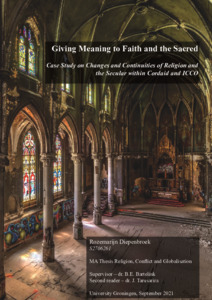Diepenbroek, Rozemarijn
Giving Meaning to Faith and the Sacred: Case Study on Changes and Continuities of Religion and the Secular within Cordaid and ICCO.
Master thesis, Master Religion Conflict and Globalisation.
![[img]](https://rcs.studenttheses.ub.rug.nl/691/1.hassmallThumbnailVersion/2021-2022%20RCG%20%20Diepenbroek%2C%20R.%20%20%20Master%20thesis.pdf)  Preview |
|
Text
2021-2022 RCG Diepenbroek, R. Master thesis.pdf
- Submitted Version
Download (1MB)
| Preview
|
Abstract
This thesis focuses on how Cordaid and ICCO, two religious non-governmental organizations, that are inspired on Catholic (Cordaid) and Protestant (ICCO) faith, maintain and adapt their religious identity in the face of powerful secularizing forces, and is based on the notion that religion and the secular are closely intertwined in the development organization. This thesis aims to deviate from an inherent dualistic understanding of religion and the secular and therefore employs the work of Barnett and Stein, who offer a relational approach to religion and the secular. In the core of their work, the authors argue that the secularization thesis is false and that rather, processes of sanctification of the secular and secularization of religious can be observed (Barnett and Stein, 2012). Founded on this operational framework, this thesis focuses on Cordaid and ICCO, as they both have long-standing traditions in the Netherlands – they have undergone the many phases of development and witnessed changing discourses of religion and secularity for development – and are therefore of particular interest for this study. On the basis of an historical account of the relationship between religion and development, particular attention is given to forces of professionalization and rationalization within Cordaid and ICCO, as well as how the organizations have changed and continue to give meaning to faith and the sacred. The central argument of this thesis is that while Cordaid and ICCO have been under financial pressure from primarily the Dutch government and while they constantly have to rebalance their positions in their particular networks, this also has led the organizations to focus on their (shared) humanitarian and religious values. Not only can processes of sanctification be found in the organizations, this may be what has made a fusion between the religious organizations possible.
| Type: |
Thesis
(Master)
|
| Supervisors (RUG): |
|
| Degree programme: |
Master Religion Conflict and Globalisation |
| Academic year: |
2021-2022 |
| Date of delivery: |
14 Oct 2022 08:19 |
| Last modified: |
14 Oct 2022 08:19 |
| URI: |
https://rcs.studenttheses.ub.rug.nl/id/eprint/691 |
Actions (requires login)
 |
View Item |

